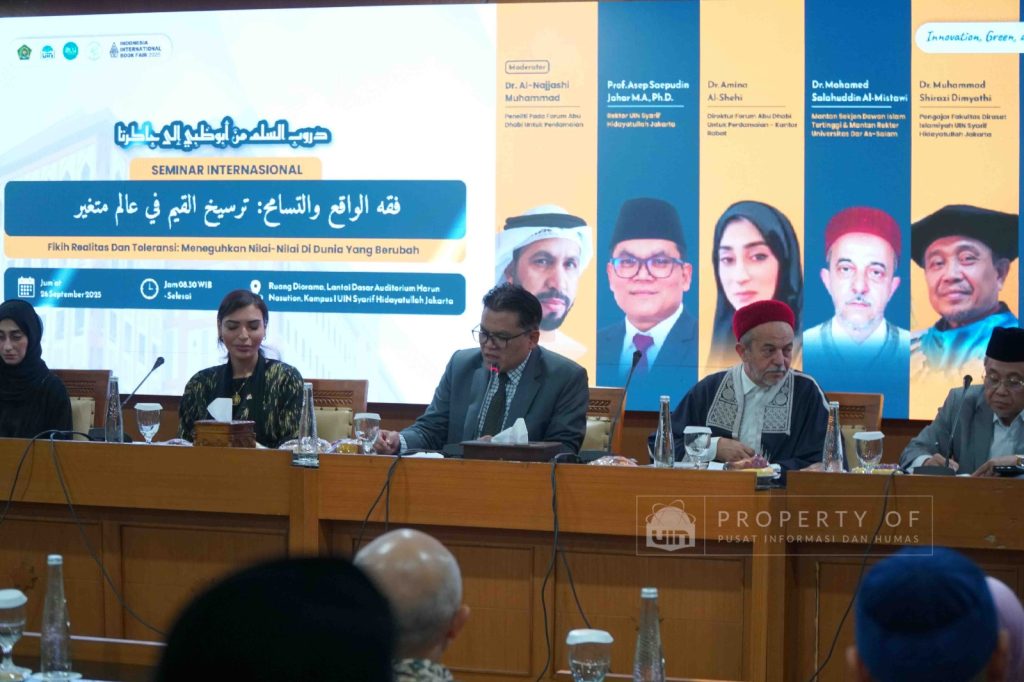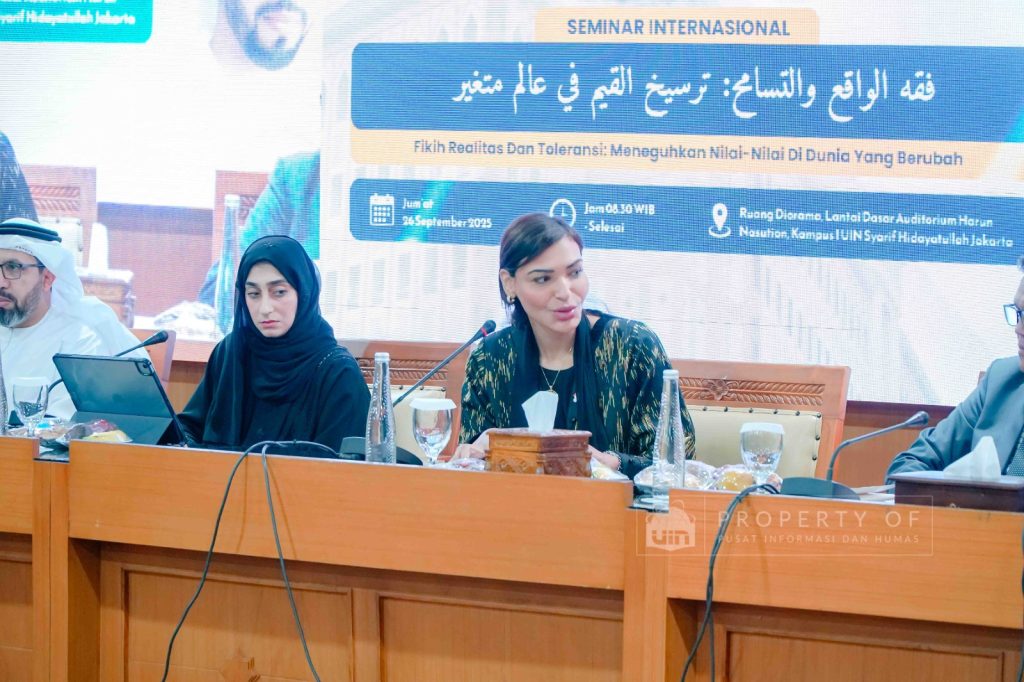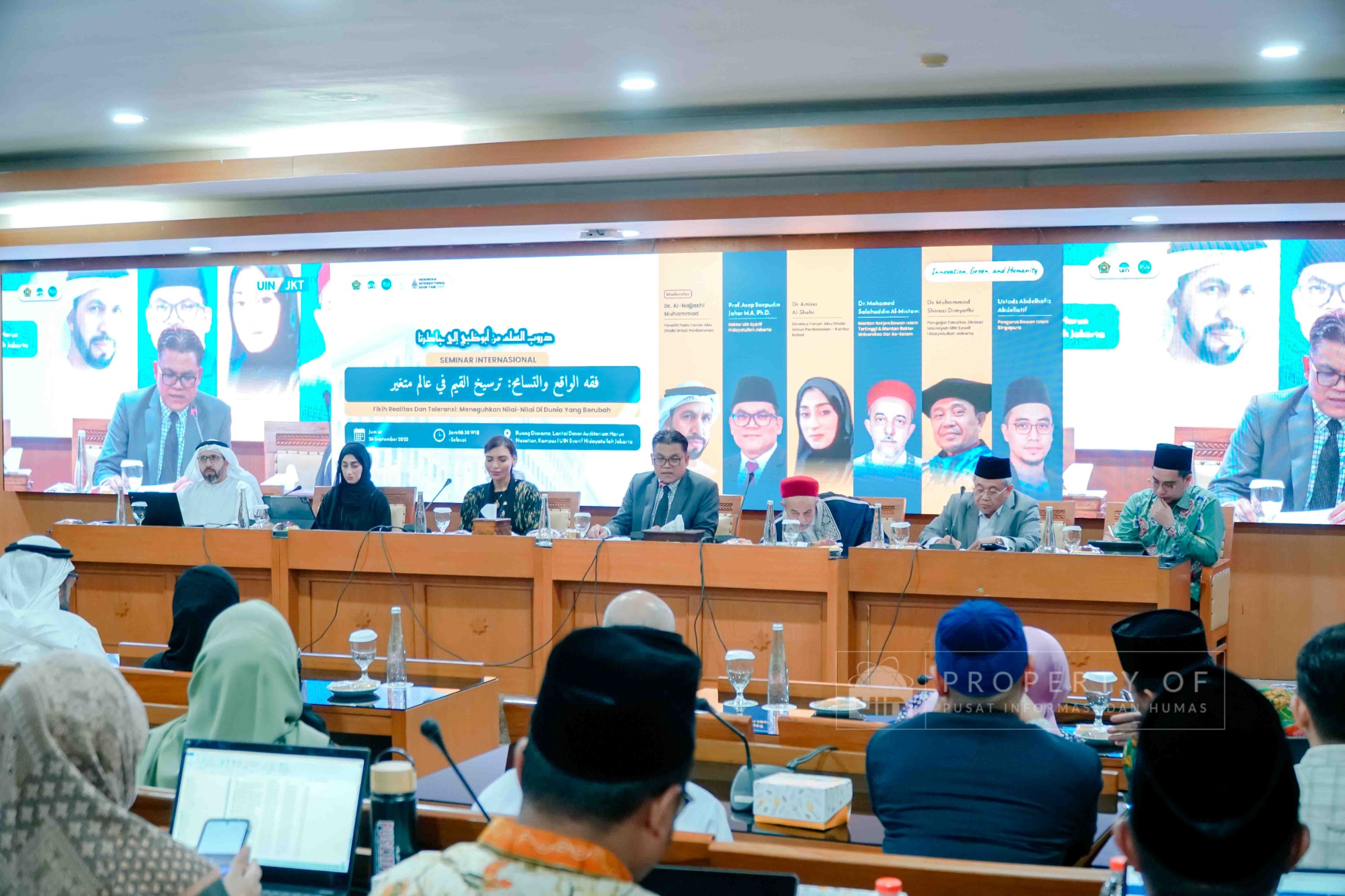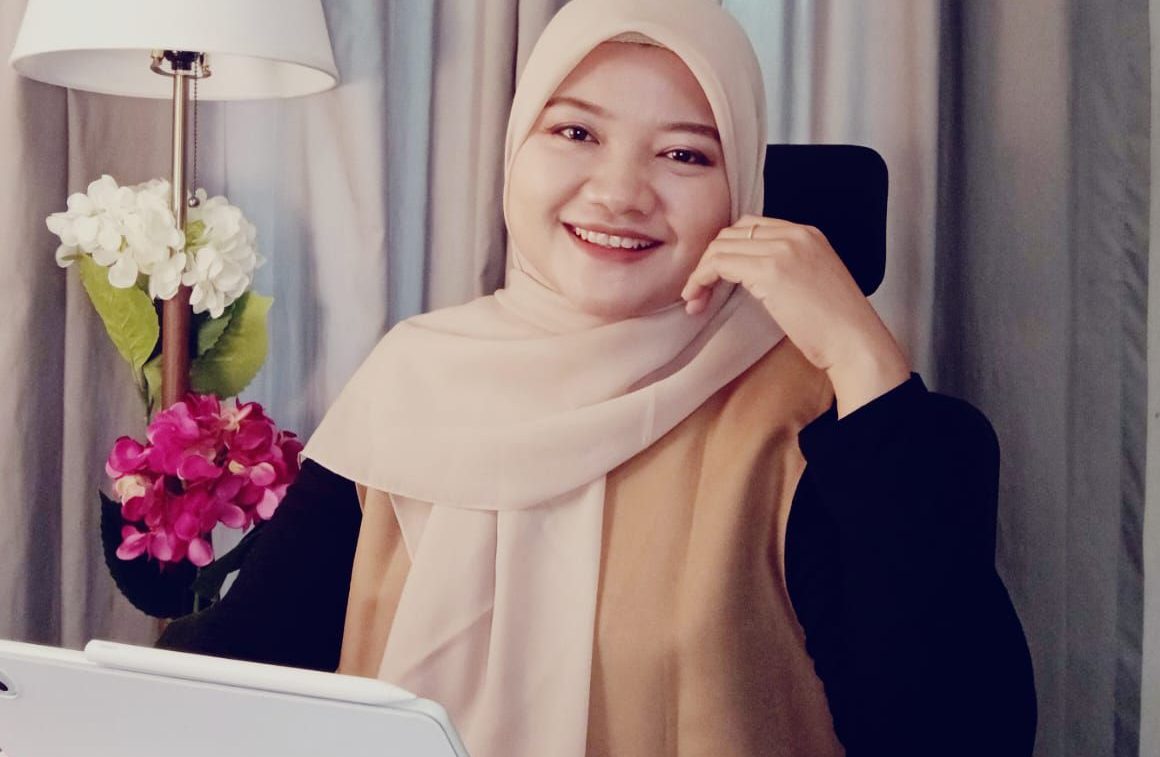Jakarta-The Banten Post, Rectorate Building Of UIN Jakarta, Academics and experts from various countries have agreed on the importance of strengthening global peace efforts in response to the dynamics of the global humanitarian crisis. Revisiting shared values, strengthening a culture of dialogue, eroding hatred, and upholding the spirit of peaceful coexistence are crucial elements that all nations must reinforce today.
This was conveyed by the international academics and experts present at the international forum collaboration between UIN Syarif Hidayatullah Jakarta and the Abu Dhabi Forum for Peace at the Harun Nasution Building, Campus I of UIN Syarif Hidayatullah Jakarta, Friday (05/26/2025). The event, titled **”Fiqh of Reality and Tolerance: Reaffirming Values in a Lost World,”** which was attended by hundreds of participants, featured a number of international academic speakers and experts.
Among them were the Director of the Abu Dhabi Forum for Peace, Rabat Office, Dr. Amina Al-Shehi; Former Secretary General of the Supreme Islamic Council and Former Rector of Dar As-Salam University, Dr. Mohamed Salahuddin Al-Mistawi; Lecturer at the Faculty of Islamic Studies, UIN Jakarta, Dr. Muhammad Syairozi Dimyathi; and Member of the Islamic Council of Singapore, Ustadz Abdelhafiz Abdellatif. Also present were UIN Jakarta professors such as Prof. Dr. Hj. Amany Lubis, M.A. and Prof. Arif Zamhari, M.A., Ph.D.
The forum was opened directly by the Rector of UIN Syarif Hidayatullah Jakarta, Prof. Asep Saepudin Jahar, M.A., Ph.D. On the same occasion, Mrs. Shaima Salem Alhebsi, Deputy Head of Mission at the Embassy of the United Arab Emirates in Jakarta, was also present and delivered remarks.
 In her speech, Mrs. Shaima Salem Alhebsi reminded that global society currently faces various global challenges such as armed conflicts, natural disasters, climate change, as well as ideological and intellectual crises. **”All of these demand that we revisit shared values, strengthen a culture of dialogue, eradicate hatred, and uphold the spirit of peaceful coexistence,”** she emphasized.
In her speech, Mrs. Shaima Salem Alhebsi reminded that global society currently faces various global challenges such as armed conflicts, natural disasters, climate change, as well as ideological and intellectual crises. **”All of these demand that we revisit shared values, strengthen a culture of dialogue, eradicate hatred, and uphold the spirit of peaceful coexistence,”** she emphasized.
Therefore, Mrs. Shaima Salem Alhebsi responded positively to the forum, which brings together international academics and experts to produce resolutions for peace and solutions to the global humanitarian crisis. According to her, dialogue and cooperative initiatives among international academics and policymakers are valuable assets for the world as a whole.
“Reinforcing shared values is the first step towards sustainable peace. With our shared history, values, and common interests, we can contribute to building a safer, more just, and tolerant future,” she stated.
Mrs. Shaima Salem Alhebsi added that the United Arab Emirates and Indonesia are two countries that have affirmed their respective commitments to making tolerance, moderation, and peaceful coexistence core principles in their policies and initiatives, both domestically and internationally. The UAE, for example, has established the Ministry of Tolerance, the Abu Dhabi Forum for Peace, the Muslim Council of Elders, and various other global initiatives.
“Meanwhile, our friend, the Republic of Indonesia, is a tangible example of the values of coexistence and respect for diversity. The Indonesian state philosophy, Bhinneka Tunggal Ika, rooted in Pancasila, is a symbol and model of tolerance for the world, she appreciated.
Addressing the global humanitarian crisis, the Director of the Abu Dhabi Forum for Peace, Dr. Amina, explained that resolving humanitarian crises now requires a new approach that is not only intellectually oriented but also based on universal humanitarian values and the principle of economic justice.
“We emphasize the importance of developing a new approach focused on strengthening humanitarian values and establishing the principle of economic justice. This model serves as a relevant scholarly foundation to address various issues without exception and to bridge existing differences,” she explained.
Lecturer at the Faculty of Islamic Studies, UIN Jakarta, Dr. Muhammad Syairozi Dimyathi, stated that a contextual *fiqh* (Islamic jurisprudence) approach is crucial in responding to contemporary developments. In this regard, he emphasized the necessity for Islamic law to be adaptive to new issues and to prioritize according to needs, so that Islamic law remains relevant and brings benefit to humanity in every time and place.
“Contextual fiqh is a fundamental key in our efforts to respond to the rapid waves of progress. Islamic law must not be static. It must have a high adaptive capacity towards emerging new issues,” he explained.
Meanwhile, Dr. Salahuddin Al-Mistawi said that mastering *maqasid al-shari’ah* (the higher objectives of Islamic law) as a scholarly tool must be the primary foundation in formulating contextual *fiqh* to realize human benefit and prevent harm. He recommended that Muslims deepen their understanding of the thoughts of great scholars like al-‘Allamah Abdullah bin Bayyah and others, who promote a comprehensive, adaptive understanding of Islamic teachings aligned with the principle of *raḥmatan lil-‘alamin* (a mercy to all worlds).
“I emphasize the importance of mastering maqasid al-shari’ah as the main foundation in formulating contextual fiqh. I also highly recommend that Muslims delve into the thoughts of great scholars, especially the works of al-‘Allamah Abdullah bin Bayyah, to achieve a comprehensive, flexible understanding of Islam that is in line with the spirit of raḥmatan lil-‘alamin,” he explained.
Meanwhile, Rector Asep Jahar highlighted the relevance of the forum’s theme for academics and experts seeking solutions to the global humanitarian crisis. **”Because we live in an era full of rapid changes in social, political, cultural, and even ideological spheres. Presenting a ‘fiqh of reality’ is an urgent necessity so that Islamic teachings can wisely, humanely, and respectfully respond to humanitarian challenges amidst diversity,” he elaborated.
Rector Asep Jahar added that the ‘fiqh of reality and tolerance’ is an important gateway to a peaceful, moderate religious life full of mutual respect. “With this spirit, we can strengthen the ability of Muslims to coexist, build dialogue, and present Islam as a mercy to all worlds,” he added.
Emphasizing the importance of strengthening efforts to address various global humanitarian problems, UIN Syarif Hidayatullah Jakarta and the Abu Dhabi Forum for Peace agreed to cooperate through an academic and research partnership. The partnership was signed directly by the Rector of UIN Jakarta, Prof. Asep Saepudin Jahar, and the Director of the Abu Dhabi Forum for Peace, Rabat Office, Dr. Amina Al-Shehi.
Separately, both Professor Amany and Professor Arif Zamhari responded positively to the forum, which lasted over two hours. Professor Amany stated that this forum continues the message about the importance of strengthening global harmony and peace, which is the mission of the Abu Dhabi Forum for Peace, founded by the prominent global Islamic scholar, al-Allamah Sheikh Abdullah bin Bayyah, who has contributed significantly to world peace through various international conferences such as the 2016 Marrakesh Declaration emphasizing the importance of respecting the Rights of Religious Minorities in Muslim-Majority Countries and the Conference of Cross-Religious Leaders in Washington, D.C., in February 2018, which produced the Alliance of Virtues.
“The presence of the Abu Dhabi Forum for Peace in Indonesia is expected to become a bridge for interfaith and intercultural dialogue relevant to current global challenges, while also strengthening Indonesia’s contribution to world peace,” she added.
Professor Arif Zamhari, who is also the Head of the Center for Religious Moderation at UIN Syarif Hidayatullah Jakarta, assessed this forum of international academics and experts positively. According to him, this activity is highly relevant and urgent to be revitalized.
“The Abu Dhabi Forum for Peace in Indonesia is expected to serve as a bridge for interfaith and intercultural dialogue relevant to today’s global challenges, while also strengthening Indonesia’s contribution to pursuing world peace, he explained.
According to Professor Arif, tolerance is not only a universal value but also an important dimension in Islamic teachings where faith and tolerance are inseparable. **”A truly faithful Muslim must have a tolerant attitude, as commanded in the Quran. Without tolerance, faith can slide into extremism, and extremism is clearly not part of Islamic teachings,”he concluded. (Press Release from the Center for Information and Public Relations of UIN Syarif Hidayatullah Jakarta)




